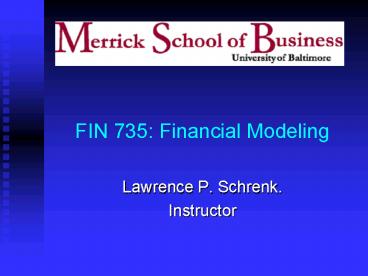FIN 735: Financial Modeling
1 / 18
Title:
FIN 735: Financial Modeling
Description:
Money Central. FIN 735: Financial Modeling. Lawrence P. Schrenk. 1.4 ... Money Central. http://moneycentral.msn.com/ An MSN/Microsoft Product. Company Data ... – PowerPoint PPT presentation
Number of Views:34
Avg rating:3.0/5.0
Title: FIN 735: Financial Modeling
1
FIN 735 Financial Modeling
- Lawrence P. Schrenk.
- Instructor
2
- Financial Basics
3
Overview
- Returns
- Holding Period Return
- Annualizing Returns
- Continuous-Time Returns
- Data Sources
- Fred
- EDGAR
- Money Central
4
Financial Data
- Financial Data can be ambiguous. It can be
presented - As a dollar value or a return
- a return of five percent can be written as
either 0.05 or just 5. - In annual, monthly, daily, etc. form
- form new-to-old or old-to-new
5
Holding Period Return
- The holding period return is the return over some
period of time. - We calculate it from prices or levels
6
Holding Period Return (contd)
- Stock A sells for 46.99 in January and 48.51 in
February. - But note this is the monthly return!
7
Holding Period Return (contd)
- But this is not very useful if we are comparing
assets with different holding periods. - How do you easily tell whether a quarterly or
monthly return is better?
8
Annualizing Returns
- Returns are typically annualized to give their
equivalent annual return (EAR) - For our example
9
Annualizing Returns (contd)
- We can also move in the opposite direction
- For our example
10
Continuous Time
- In some applications, especially, derivatives, it
is easiest to use continuous discounting/compoundi
ng. This is to assume that there are an infinite
number of periods, m, in a year.
11
Continuous Time (contd)
- The formula is
- Note, that in Excel, this would be
- EXP(rt) - 1
12
Continuous Time (contd)
- If the annual continuous time rate is 10, then
the semi-annual, continuous rate is
13
Continuous Time (contd)
- Finally, we can convert the discrete annual rate
to the continuous annual rate as follows
14
Continuous Time (contd)
- An annual, continuous rate of 10 is equivalent
to
15
Summary
- You should be able to
- Convert dollar returns to holding period returns,
- Holding period returns to EAR (and vice versa),
and - Use continuous-time returns and convert between
continuous and discrete returns.
16
Data Sites
- FRED
- http//research.stlouisfed.org/fred2/
- Data
- Interest rates
- CPI, PPI
- Banking Data
- Macroeconomic Data
17
Data Sites (contd)
- Edgar
- http//www.sec.gov/edgar.shtml
- SEC files since 1993
- Millions of forms
- EdgarScan
- http//edgarscan.pwcglobal.com/servlets/edgarscan
- A better interface/search engine.
18
Data Sites (contd)
- Money Central
- http//moneycentral.msn.com/
- An MSN/Microsoft Product
- Company Data
- Easy Download of Stock Prices
- You do need to install some of their software































